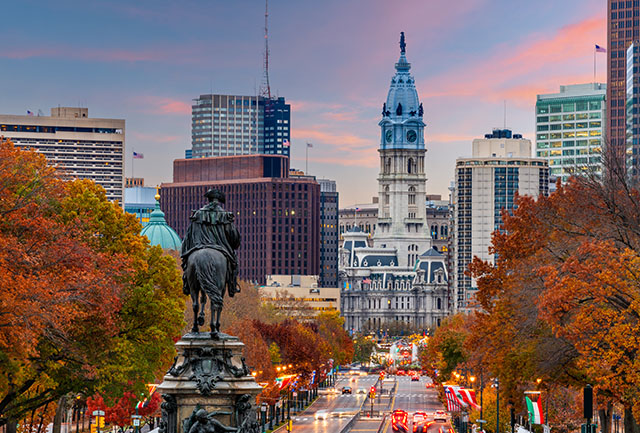
The Pros and Cons of Living in Philadelphia
Philadelphia Pennsylvania
As one of the largest cities on the East Coast (and the entire country, for that matter), there’s a lot to like about the nation’s former capital — it’s the place where American independence first came to be, after all. However, it’s important to familiarize yourself with the pros and cons of living in Philadelphia before you decide to make the big move. Here’s what we think you should know before you go.
| Planning a move to Philly? Start by getting a quote from PODS. |
Fun Facts You Should Know About Philadelphia
- Philly was the nation’s capital from 1790 to 1800, prior to Washington, D.C., taking on the title.
- If you’re moving to Philly, you’re likely going to have a cheesesteak at some point. This iconic food has been a local staple since the 1930s.
- Philly is what some might call a “city of firsts.” It’s the birthplace of the country’s first hospital, first university, first library, and even the first zoo.
- The crack on the Liberty Bell is quite the sight to see, and it still remains a mystery as to how it got there!
- Philly holds the title of “Mural Capital of the U.S.,” and with over 3,500 found across the city, it’s easy to see why.
- Philly’s population prides itself on its eclectic and diverse neighborhoods, as 40.1 percent of residents are Black or African American and 15.7 percent are Hispanic or Latino.
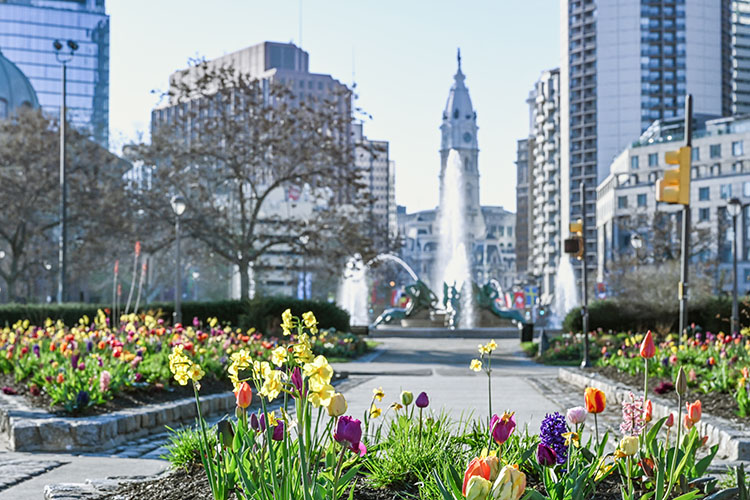
Living in Philadelphia Pros and Cons — FAQs
Q: What is the downside of Philadelphia?
A: One of the major downsides of living in Philadelphia is the high crime rate — both property and violent crimes. As with any big city, though, as long as you stay alert and learn where the safest areas are, you can typically avoid trouble.
Q: Why should people move to Philadelphia?
A: Philly is a bustling city with something to explore any time of the year. From the deeply rooted local history to some of the best dining spots on the East Coast, it’s easy to see what we mean. Also, you’re just a train ride away from major hubs like New York City and Washington, D.C., but you’re paying a fraction of the price to live there.
Q: Is Philadelphia an affordable city to live?
A: Philly’s cost of living index comes in at 104.3, which might be higher than the national index of 100, but it’s much lower than other cities in the Northeast and New England. With just a train ride, you can get to New York City; Washington, D.C.; or Jersey City, where the cost of living indices come in at 172.5, 151.9, and 139.5, respectively.
Q: What salary do you need to live comfortably in Philadelphia?
A: According to MIT’s Living Wage Calculator, a family of four with two working adults should make about $115,700 before taxes to live comfortably. A single adult with no children should make about $46,400 before taxes to live comfortably.
Living in Philadelphia — Pros and Cons
Philadelphia is situated in a prime East Coast location, with all of the desirable big-city amenities one could ask for. From exploring the local art, history, and culture to dining at one of the city’s beloved local restaurants, the excitement never ends in the City of Brotherly Love. But just like with any other major city, there are going to be disadvantages, and it’s important to take them into consideration. Here are a few of the biggest pros and cons of living in Philadelphia.
Pro: Affordable Cost of Living for a Major City
Philly’s cost of living index is 104.3, which is about 10.3 percent higher than the state average. That might seem steep, but it’s considered quite affordable, due to the city’s history and overall accessibility. Compared to nearby metros — like New York City, where the cost of living is 172.5 — Philly may seem like a retreat.
Con: High Crime Rate
Is Philadelphia safe? Unfortunately, Philly doesn’t have a great reputation when it comes to crime statistics. It’s estimated that the city is only safer than 2 percent of other neighborhoods in the U.S. What’s more, within Pennsylvania, more than 99 percent of communities have a lower crime rate. Some of the most dangerous neighborhoods in the city include Wissinoming East, Germantown Morton, and Mayfair.
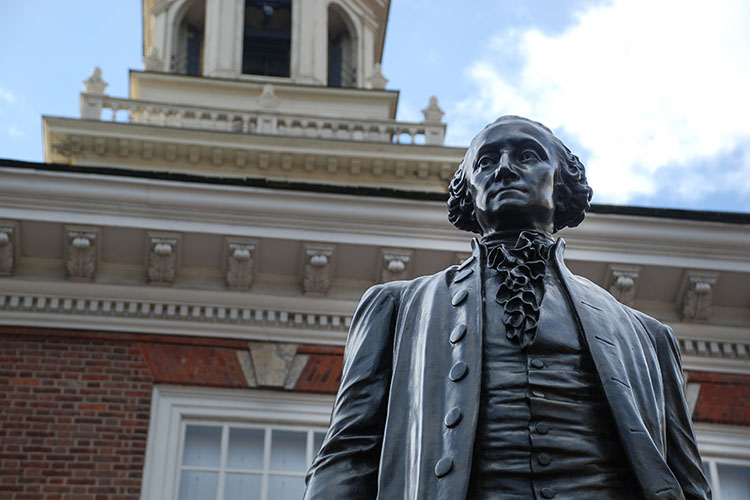
Independence Hall in Philadelphia, PA
Pro: Deep-Rooted History
It’s no surprise that history buffs can have a field day in Philadelphia. First settled in 1682 by William Penn, Philly used to be one of the biggest ship-building centers on the entire East Coast. In 1776, the Declaration of Independence was signed at the Pennsylvania State House, which is now known as Independence Hall. Of course, the Liberty Bell is a popular site to visit in the city. And that doesn’t even begin to scratch the surface!
Con: Harsh Winter Weather
One of the benefits of living in Philadelphia is having access to history at your fingertips, right? Well, it might not be very comfortable to explore that history year-round. Most areas have impressive walk scores, making them easy to explore by foot, but winter combats those scores with icy sidewalks and freezing temperatures.
Similar to many other northeast cities, temperatures can sometimes drop below freezing, and snow storms are not all that uncommon. Ensuring you’re prepared ahead of time with winter boots and warm clothes can make exploring easier, though.
Pro: Favorable Public Transportation
Those who rely on public transportation to get around will have an easy time navigating Philly, as the city has one of the best public transportation networks in the country. The system is operated by SEPTA, known for their efforts to reduce the impact on the environment.Trains, subways, buses, and trolleys are all means of public transportation in Philly. The rail network is a part of the Northeast corridor, the subway system has two lines, and the buses span over 100 routes. The historical trolleys are also updated with more modern amenities and serve the area’s most popular attractions and best neighborhoods.
Con: Unusual Liquor Laws
If you’re moving to the state of Pennsylvania for the first time, you may be surprised to know that liquor licenses are difficult to obtain, so many restaurants in the city are completely BYOB (Bring Your Own Beer). If you’re looking to buy wine and liquor, you can only do so at state-owned wine and spirits stores, while you can travel to a local distributor to get beer.
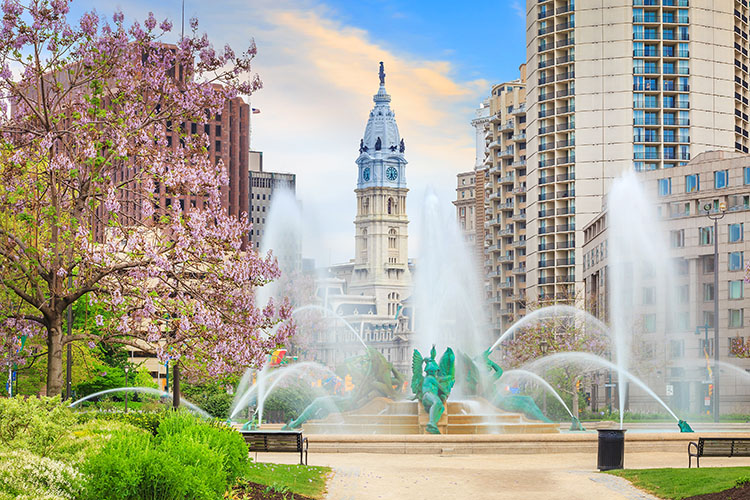
Swann Memorial Fountain in Philadelphia, PA
Pro: Lots of Beautiful Outdoor Spaces
When Philly was first founded, the amount of forested space found in the area was quite impressive. While you may think of tall buildings and a bustling city atmosphere when Philadelphia comes to mind, there are lots of ways to enjoy the outdoors locally and remain active. From exploring trails to admiring harbor views, you’re sure to find an outdoor spot calling your name.
Here are some of the best outdoor areas in the City of Brotherly Love:
Con: Lack of Decent Public Schools
With an affordable cost of living and convenient amenities all around the city, Philly is a hotspot for families. However, the public school system in Philly overall is not among the best, and it can be challenging to ensure a good education for your children. There are great schools depending on the neighborhood you choose, though, so be sure to conduct plenty of research before making your final decision.
Pro: More Appealing Higher Education Options
The public school system in Philly doesn’t have the best reputation, but the same is definitely not true for higher education. Some of the state’s best colleges and universities are found in Philly, meaning you’ll have your pick of the litter no matter what industry you’re interested in.
The best higher education options in Philly include:
- University of Pennsylvania
- Temple University
- Drexel College
- Villanova University
- West Chester University of Pennsylvania
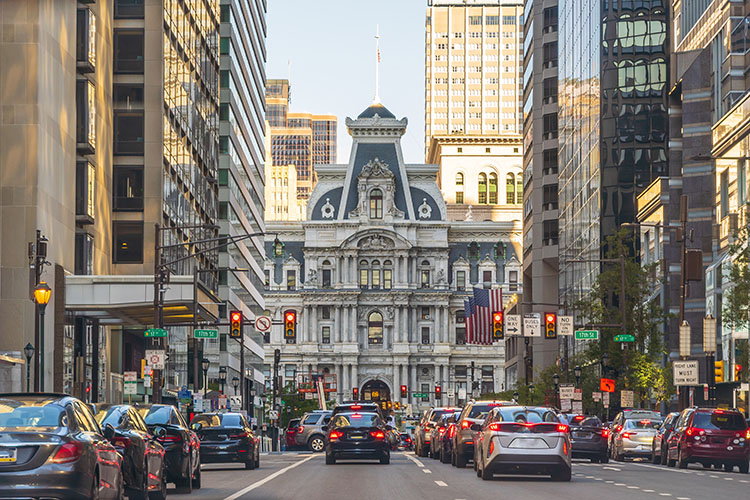
Con: Rough Commutes
Whether you’re commuting to work or school, driving throughout Philadelphia can be quite difficult if you prefer to have your own car. It’s actually considered one of the worst cities in America when it comes to traffic, and the city’s high population only adds fuel to the fire. The city’s bustling tourism industry draws in a plethora of additional people, and the narrow streets throughout the city certainly don’t help.
Pro: Delectable Dining Scene
Cheesesteaks may be Philly’s signature food, but there are plenty of other options (like soft pretzels!) to suit anyone’s taste. International cuisine is also available, like specialities in Vietnamese, Chinese, Mexican, Japanese, and many more. Pizzeria Beddia! and Suraya are two great local favorites. And besides your typical restaurant experiences, fine dining experiences are one of the best pros out of all the pros and cons of living in Philadelphia!
Con: Wage Taxes
Philly levies a wage tax on its residents, which is not necessarily uncommon compared to other states across the country, but it’s worth mentioning. A wage tax is an additional income tax paid directly to the city. It’s applied to all residents, regardless of employment status, and must be filed quarterly. Currently, it’s sitting at 3.75 percent, down from last year’s 3.79 percent.
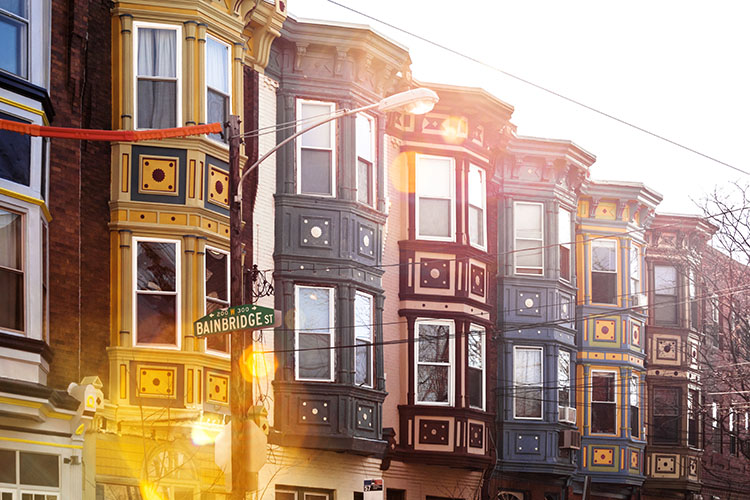
South Street in Philadelphia, PA
Pro: Affordable Housing
You can find some of the nation’s most expensive homes in nearby cities, like Washington, D.C., and NYC. However, throughout Philly’s large metro area, you can find a diverse range of affordable housing options, including everything from luxury condos to historic mansions. And the average home value is under the national average of $342,900, coming in at just $212,300.
Con: Lack of Detached Homes
Row houses are an architectural staple in many major cities across the Northeast, including Baltimore, New York City, Washington, D.C., and — you guessed it — Philadelphia. However, because these homes are attached, you’ll be sharing walls with your neighbors. If you’re moving from the suburbs, this is going to take some adjustment.
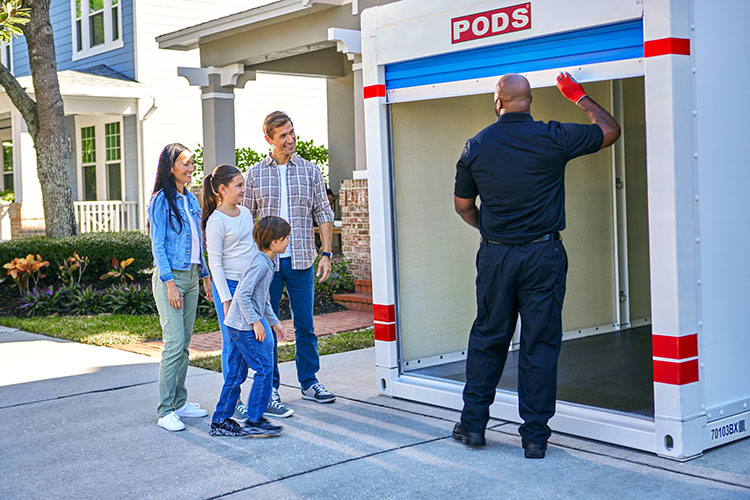
Use PODS for Your Philadelphia Move
Once you’ve weighed the pros and cons of living in Philadelphia and decided to make the move, let PODS help you get there. Have a portable moving and storage container delivered to your doorstep, where you can pack and load your belongings on your own time. And the best part? With PODS City Services, you won’t have to worry about navigating the narrow Philly streets and other issues that can easily arise with a big-city move.
Editor’s note: For ease of reading, monthly rental prices were rounded to the nearest $25 and home values were rounded to the nearest $100.
Related Articles
Comments
Leave a Comment
Your email address will not be published. Required fields are marked *
